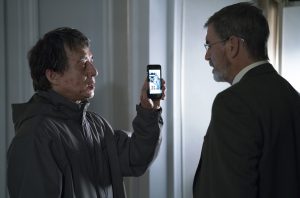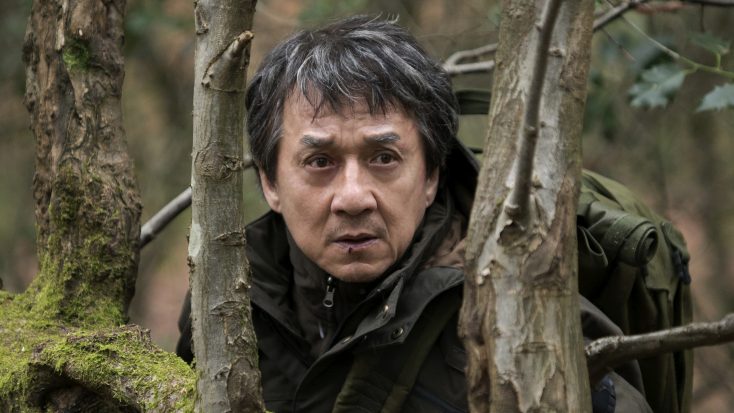
(Left to Right) Jackie Chan as Quan and Pierce Brosnan as Hennessy in hotel suite in THE FOREIGNER. ©STX. CR: Christopher Raphael.
By ANGELA DAWSON
Front Row Features
HOLLYWOOD—With a wave of terrorist bombings in London, Manchester, Belgium and elsewhere, no one is safe from the insane acts of mass murderers obsessed with creating as much carnage as possible—whether their motivation is based on political or other reasons. That is why Jackie Chan’s new movie “The Foreigner,” based on Stephen Leatherman’s novel “The Chinaman,” is as relevant today as it was when the book was first published in 1992. In a rare dramatic turn, Chan, who is getting a lot of positive buzz for his performance, plays a grief-stricken widower who embarks on a quest to track down those responsible for a devastating attack in London that took the life of his teenage daughter. With no family left, Chan’s Quan, the humble immigrant owner of a Chinese restaurant, seeks the assistance of the Irish Deputy Minister (Pierce Brosnan), who may know more about the attackers than he lets on. He initially dismisses Quan’s pleas for assistance as an annoyance, until Quan, who has a secret past, steps up his tactics in convincing the government bureaucrat to give him the names of the attackers.
Chan, a youthful-looking 63, spoke at a press conference about playing an elderly vigilante in the action drama directed by Martin Campbell (“Casino Royale,” “GoldenEye”), from an adapted screenplay by David Marconi (“Enemy of the State,” “Live Free or Die Hard”). Asked about finally taking home an honorary Oscar last year from the Academy of Motion Pictures Arts & Sciences after a half-century of moviemaking both in the U.S. and in China, Chan says the acknowledgment was humbling.
Q: What was your attraction to this project and role?
Chan: I have been planning my career for so long. As I look at the history, it’s the action star life. Look at Robert Redford (actor) right now—he’s still acting. I want to be an actor. The audience always treated me as a comedy action star. In Asia, I am already very tough. I started to change slowly for the last 20 years and my fans in Asia have accepted me as an actor and not an action star. But, in Hollywood, I receive so many scripts where I play a role as policeman from Hong Kong or policeman from China or a secret policeman from Hong Kong or a secret policeman from China.
I’ve watched so many American movies and I’ve said that those roles are suitable for me, but why doesn’t anybody hire me to do those kinds of movies? I’m not saying (I should be cast in) “La La Land” but for other movies, why not me? A couple of years ago, I suddenly got a call from my American manager and he told me about “The Foreigner” script. The screenwriter (Marconi) said that only Jackie Chan can play this role. Time had passed and I had been waiting for so many years and had so many things going on. I ended up waiting until two years later when it all come together. I am so happy I got to it.
Q: How did you prepare for this role?
Chan: The only thing I prepared for was getting a dialogue couch to teach me English. Also, I have to understand (Irish actor) Pierce Brosnan when he speaks because he has a very different (English) accent, and I need to know what he’s saying when I speak my dialogue. On set, the director taught me a lot of things. He told me to move slower and reminded me that I am not Jackie Chan (the action star), I am Quan.
Sometimes, when I turned around and moved, he would say, “Jackie, too quick. You need to slow down.” I don’t know why he made me so old in this movie. Even the fighting, he would say, “No. Breathe. You have to breathe (heavy, as though out of breath).” After I hit someone, then I needed to sound out of breath.
Q: Why did you choose to do this movie?
Chan: Why I chose this movie is because a few years ago, I needed to make something correct. When I made “Drunken Master,” it was to tell people to drink and fight. This is wrong. I told myself, “Why did I tell people to drink and fight?” So, I had to make “Drunken Master II” to correct myself and to tell people not to drink and not to fight. Through all of those years I have traveled and seen so many things I do not like. What should I do? I am a filmmaker. I saw in the Middle East, there are so many wars going on. I made a movie called “Dragon Blade,” which is about peace and unity. I hope with all my heart through that movie that all international treasures are returned to their own countries. In (Cambodia’s) Angkor Wat, I saw a beautiful half Buddha face gone missing. It’s in a museum and why doesn’t someone return it? It belongs to the whole world; it does not belong to one museum. I’m so happy that after the (2012’s) “Chinese Zodiac” was finished, treasures were being returned back to China and I was so happy.
Right now, there are terrorist attacks every single day all around the world. I always said that natural disasters like hurricanes and tornadoes and tsunamis happen all the time. Why do humans create human disaster? I’m hoping that through this movie, we can stop these kinds of things, not killing innocent people every single day. It happens all around the world and we have to live with it.
Q: What did you find through this film?
Chan: I found through this film, a few years later when I’m old what will happen to me. I will have to walk slowly and quiet(ly)—a humble, old guy. I just remember every day with the makeup (I had to sit there) for 4-5 hours. The director said, “You don’t look old enough. I want you to look older.” (And then again and again), “Older. Older.” (He sighs with mock exasperation) I was like, “Oh, God.” It was non-stop. I’m glad that you said that you like it. (That means) I achieved my goal. That’s what I wanted for the future. I learned a lot of things (about) the character. He’s so good. He has a background that nobody (knows about). He doesn’t want to talk about it. He just pulls it inside. He’s quiet. Living in London (where) he has a restaurant. That’s all he wants. He wants (to live) peacefully (and) to have his own life. Then, a tragedy happens to his daughter. He just wants (asks for translation and his translator says “righteous.”) It’s always difficult. He asks the police, the government (for help). He’s just (has a) simple (goal). “Just give me the name (of the bomber),” that’s all. The whole movie is about him wanting to get the name. Otherwise, (the bad guys) will continue killing people.
Q: You’ve had so much success in different fields. Where does getting that honorary Oscar rank? What does it mean to you?
Chan: When I heard (I was going to get the honorary) Oscar, I didn’t believe it. “Why me?” I’m just making cheap, action comedy movies. The Oscars (normally) go (to actors) like Tom Hanks, Robert De Niro—these kinds of actors—(so) why me? After I asked the Chairman of the Oscar committee, why me, he said, “because you do so many things. Not just acting. Before acting, you’ve done so many things—for animals, for charity. For 50 years, we’ve been looking (at) you.” Fifty people agreed for the first time (on the committee to bestow the award on Chan.) I asked, “Why did my name come up?” He said, “We’d been arguing about (other potential recipients).” (He goes into a mock argument about the members of the committee debating.) But when they (suggested) Jackie Chan, 50 people raised their hand. I said, “Okay.” Then I realized all those years, I never thought I could get anything. No matter (how) cheap (a) movie, or how expensive (a) movie, terrible movie, good movie, every movie I’ve made is like gambling. “The Foreigner,” I don’t know if it’s good or bad, or whether the audience would like it or not.
Some movies you spend a lot of money on and (they fail at the box office), and some movies you spend little money on and they become big successes. You just don’t know. I just followed my dream to do the best I can. Every movie I make for the rest of my life I will do the best I can. When I have time, I do (some) charity—helping people, helping the young generation. I started the Jackie Chan Foundation. Then I started the Jackie Chan Training Center to train a lot of young talent. I never thought I would win something. Never. As for receiving the Oscar, in the old days, I wanted to win an Oscar for so many years. Then I gave up. Now, suddenly, the Oscars come to me. So now, this is what I tell my young children, “Do the best you can. Don’t aim for anything.” A few years later, maybe 10-20 years later, everything—the money, the fame, the rewards—will come to you.”





